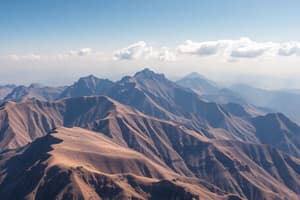Podcast
Questions and Answers
What does Physical Geography primarily focus on?
What does Physical Geography primarily focus on?
- Natural features and processes of the Earth (correct)
- Human cultural practices and demographics
- Economic trade routes and resource location
- Urban development and city planning
Which of the following is NOT a key topic studied in Human Geography?
Which of the following is NOT a key topic studied in Human Geography?
- Population Geography
- Urban Geography
- Biogeography (correct)
- Cultural Geography
What type of map would most likely focus on population density?
What type of map would most likely focus on population density?
- Physical map
- Thematic map (correct)
- Topographic map
- Political map
Which geographic concept relates to the specific coordinates used to pinpoint a location on Earth?
Which geographic concept relates to the specific coordinates used to pinpoint a location on Earth?
In which area of study would the examination of trade routes and industry location fit best?
In which area of study would the examination of trade routes and industry location fit best?
Which of these best describes the function of Geographic Information Systems (GIS)?
Which of these best describes the function of Geographic Information Systems (GIS)?
Which region would NOT typically be classified under the term Sub-Saharan Africa?
Which region would NOT typically be classified under the term Sub-Saharan Africa?
Which factor does NOT typically influence climate and weather patterns studied in Physical Geography?
Which factor does NOT typically influence climate and weather patterns studied in Physical Geography?
Flashcards are hidden until you start studying
Study Notes
Definition of Geography
- Study of the Earth’s landscapes, environments, and the relationships between people and their environments.
- Divided into two main branches: Physical Geography and Human Geography.
Physical Geography
- Focuses on natural features and processes of the Earth.
- Key components include:
- Landforms: Mountains, valleys, plateaus, hills, and plains.
- Climate and Weather: Patterns and variations influencing ecosystems.
- Biogeography: Distribution of species and ecosystems.
- Hydrology: Study of water bodies, their distribution, and effects.
Human Geography
- Examines human activities and their impact on the Earth.
- Key topics include:
- Population Geography: Distribution, density, and demographics.
- Cultural Geography: Cultural practices, languages, and traditions.
- Economic Geography: Resource distribution, trade, and industry location.
- Urban Geography: Study of cities and urban processes.
Cartography
- The art and science of map-making.
- Types of maps include:
- Physical maps (show natural features)
- Political maps (show boundaries and cities)
- Thematic maps (focus on specific themes like climate or population)
Geographic Information Systems (GIS)
- Technology for capturing, storing, analyzing, and managing spatial data.
- Used in various fields such as urban planning, environmental monitoring, and disaster management.
World Regions
- Geography is often divided into regions for study:
- Continents: Asia, Africa, North America, South America, Antarctica, Europe, Australia.
- Subregions: Middle East, Southeast Asia, Sub-Saharan Africa, etc.
Geographical Concepts
- Location: Absolute (specific coordinates) vs. Relative (contextual position).
- Place: Physical and human characteristics that make a location unique.
- Movement: Patterns of migration, trade, and communication.
- Region: Areas defined by physical or human features.
- Human-Environment Interaction: How humans adapt to and modify their environment.
Importance of Geography
- Understanding spatial relationships and interconnections.
- Informing policy decisions related to land use, climate change, and resource management.
- Enhancing awareness of global issues such as poverty, inequality, and environmental challenges.
Definition of Geography
- Encompasses the study of Earth’s landscapes, environments, and human-environment relationships.
- Divided into two core branches: Physical Geography focuses on natural elements, while Human Geography examines human impacts.
Physical Geography
- Analyzes the Earth’s natural features and processes.
- Landforms: Includes mountains, valleys, plateaus, hills, and plains.
- Climate and Weather: Investigates climate patterns and variations that affect ecosystems.
- Biogeography: Studies the geographical distribution of species and ecosystems.
- Hydrology: Examines water bodies, including their distribution and influence on the environment.
Human Geography
- Investigates human activities and their environmental impacts.
- Population Geography: Explores distribution, density, and demographic profiles.
- Cultural Geography: Examines cultural practices, languages, and traditions within populations.
- Economic Geography: Studies resource distribution, trade networks, and industrial locations.
- Urban Geography: Focuses on the development and processes within urban areas.
Cartography
- Combines art and science for effective map-making.
- Physical Maps: Depict natural features of the Earth.
- Political Maps: Show political boundaries and significant urban areas.
- Thematic Maps: Concentrate on specific themes like climate patterns or population density.
Geographic Information Systems (GIS)
- A technological tool for collecting, storing, analyzing, and managing spatial data.
- Applications span various sectors including urban planning, environmental monitoring, and disaster response.
World Regions
- Geography is categorized into distinct regions for easier study.
- Continents: Comprises Asia, Africa, North America, South America, Antarctica, Europe, and Australia.
- Subregions: Includes areas such as the Middle East, Southeast Asia, and Sub-Saharan Africa.
Geographical Concepts
- Location: Distinguished as absolute (specific coordinates) versus relative (contextual positioning).
- Place: Unique characteristics arising from physical and human features within specific locations.
- Movement: Addresses migration patterns, trade routes, and communication flows.
- Region: Defined areas influenced by physical or human characteristics.
- Human-Environment Interaction: Explores how humans adapt to and alter their surroundings.
Importance of Geography
- Essential for understanding spatial relationships and global interconnections.
- Informs policy decisions regarding land use, climate adaptation, and resource stewardship.
- Raises awareness of global challenges including poverty, inequality, and environmental sustainability.
Studying That Suits You
Use AI to generate personalized quizzes and flashcards to suit your learning preferences.




